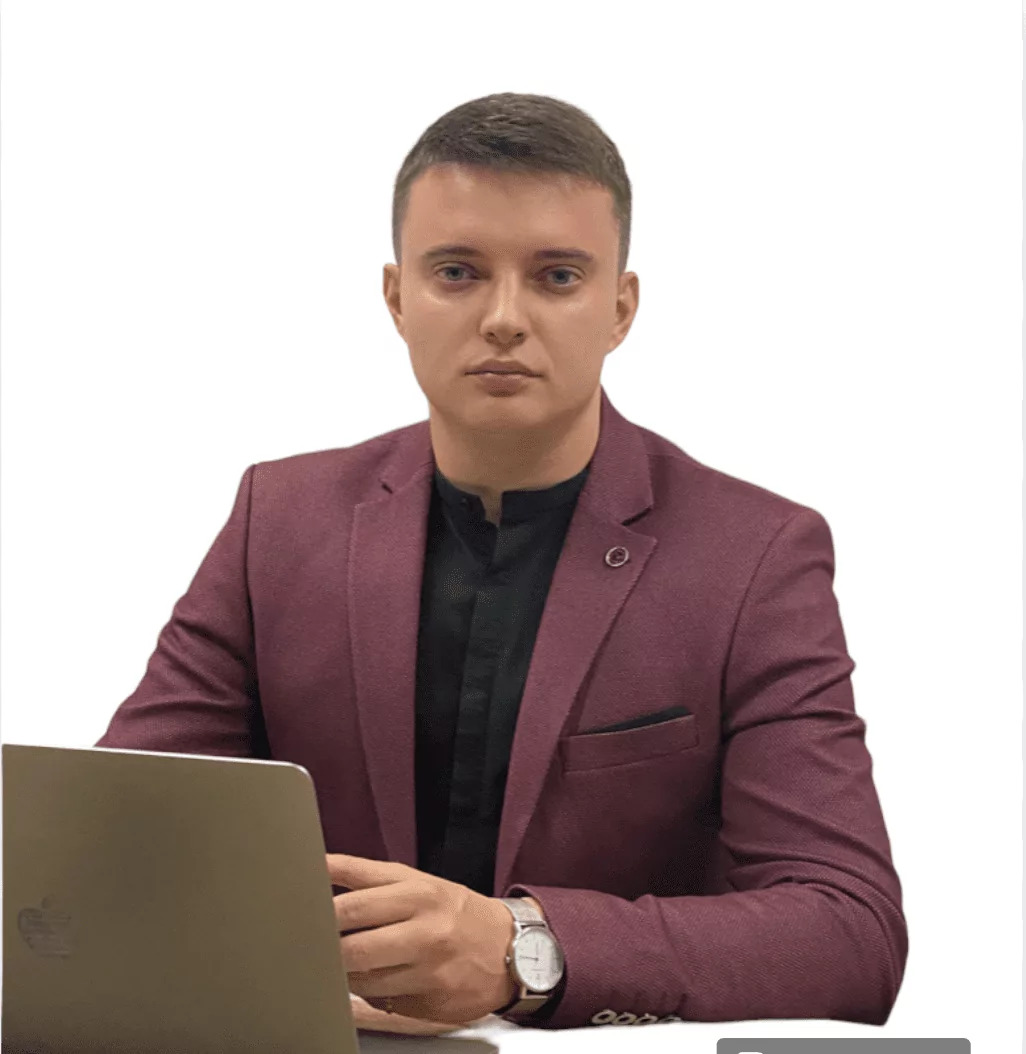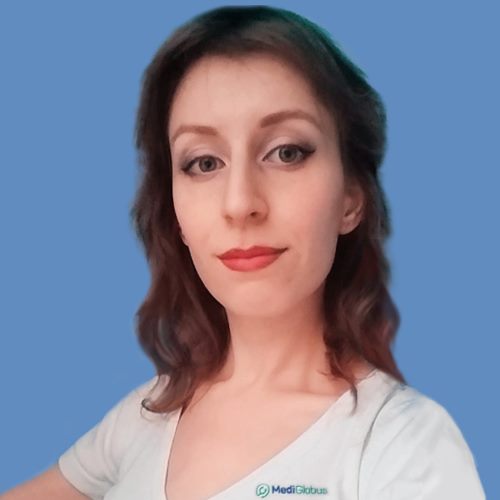On 27 September, the international medical platform Mediglobus turned 6 years old. To mark this day, we interviewed its founder and CEO, Dr. Vadym Berezhnoy, about the history of MediGlobus and the future of medical tourism.
Listen to the article:
Vadim, tell us, how did MediGlobus start? Where did you get the idea to get involved in medical tourism?
Almost 10 years ago, I was working as a doctor in a state hospital. I could see that we were not always able to offer our patients the best medical treatment possible. At the same time, I have repeatedly been to clinics abroad and have seen a completely different level of medicine, attitude to the patient, and treatment success rate. Medical service in the countries our patients come from is developing in the correct direction, but unfortunately, not fast enough.
That was when I first came across companies working in the field of online consulting and health tourism. I immediately saw the potential and, when the opportunity to try my hand at medical tourism came up, I took it.
At that time medical tourism was at the initial stages of its development in Ukraine. There were no major providers in the region yet, and the few companies that were involved did not always offer the proper level of service to their patients.
Then I had the idea of creating an internationally recognised service that could help patients find effective solutions to their medical problems. A service that would provide them with comprehensive and transparent information about doctors and clinics abroad, and that would help them to plan their trip for treatment fully and as easily as possible.
Initially, I personally handled all the applications. We also had a small team of 12 specialists who spent over a year building and populating this website from scratch. It was important to us that patients could get information about diseases and treatments in simple terms. At that time, everyone in our team worked until late at night, discussing the usability of the service, topics of content and many other details.
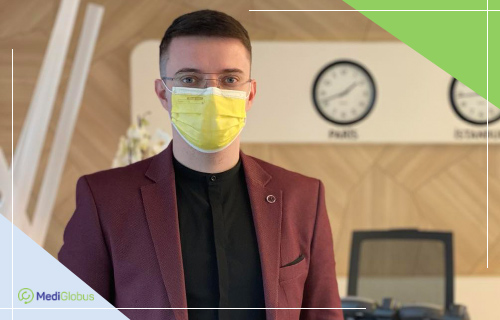
After some time, we expanded the content department, brought on more staff, and moved into our first office. We formed a department of coordinating doctors, and representatives from other countries started to join us. I should mention that I personally interviewed every member of my team.
Tell us more about how MediGlobus works. How do you differ from other medical tourism platforms?
When a patient comes to us, their case is immediately assigned to a responsible coordinating doctor. This is very important because we are not just service managers, but also medical experts. Only doctors can provide such consultation at the highest level, as well as filter the information received from clinics and present it to the patient in an accessible way. I often observe situations when health tourism services are presented by completely non-profile companies (e.g. travel agencies), interpreters and even patients themselves. I don’t think it is necessary to explain that it is not only non-transparent but also unsafe.
We listen carefully to each patient and answer their questions. Each particular case always has its nuances. People may have diseases that are difficult to treat, budget or time constraints, and there is always a risk of unpredictable situations. This is why a personalised approach is essential. We help to find the best specialist for each patient, liaise with the hospital ourselves, request quotes, collect documents, etc. This is a huge time saver for patients. Firstly, because we take over some of the organisational responsibilities. Secondly, contacting the clinic yourself often takes much longer, as clinic staff can be overloaded.

From the first days of our work, we decided that one of our main principles must be transparency. Our patients have an important choice, and it is only theirs to make. For this purpose, it is important for us to provide relevant, transparent, and, most importantly, useful information. We study in detail the problem of each person who comes to us, find out their needs, and important criteria, and based on this, we make our recommendations.
We stay in contact with our patients 24/7. Of course, everyone declares this fact, but representatives of our team now have the opportunity to personally visit patients in clinics, and help on the spot to solve any questions, often not even related to medicine. I also come to visit our patients in person, and when I see their smiles, I realise that I am doing everything right.
Last but not least, we have a large community of doctors with whom we have direct contact. This allows us to solve any medical issues more quickly, and get the necessary information on the management or condition of the patient as soon as possible. This means a faster process of organising a treatment visit and lower treatment costs.
What has MediGlobus achieved by its 6th anniversary?
Firstly, we have counselled a little over 120,000 patients since the project’s start. That’s about 1,600 referrals every month.
In 2021, MediGlobus was ranked among the top 10 medical tourism providers for plastic surgery in Turkey.
Between 2021 and 2022, 43 patients with chronic leukaemia underwent bone marrow transplantation through public and private funds, which I consider a separate achievement.
This figure may seem small, but my colleagues will understand me. One such patient can take up to 6 months of a coordinating doctor’s time. In addition to time costs, such treatment is quite complex. All our leukaemic patients are in stable remission and we still maintain warm friendly relations with many of them, watching each other’s lives on social networks.
Statistically, about 35% of patients come to us on recommendation from patients who have previously used our services. For me, this is a marker that my team is doing everything right and that we manage to justify the trust placed in us.
Medical tourism is a young and rapidly changing field. What challenges does this pose to your work and how is MediGlobus adapting to it?
Like all areas, medical tourism is dynamic. We have seasonality, “cold” and “hot” months, which is related to holidays in different countries, for example. There are also specifics of working in these conditions.
Patients may come to us with a limited budget that does not correspond to the cost of the necessary treatment. These are always difficult cases because we want to help each person, but the possibilities of action are limited. In such situations, we turn to volunteers. We maintain professional contacts with charitable foundations from different countries, which allows us to help patients with certain diagnoses to quickly collect the necessary sums for treatment.
Medical tourism has been particularly affected by the restrictions associated with the COVID-19 pandemic. I would say that at least 90% of this sector had been halted for quite a long time. Many companies left the sector altogether because they were not able to adapt to the crisis.
The first 6 months of the pandemic were completely frozen for us due to flight closures and postponed travel. However, we managed to remain fully functional thanks to several crisis solutions. I managed to retain not only the full team but also all social guarantees, which can also be considered an achievement. We switched completely to remote work for a fairly long period. At some points this reduced productivity, but the load on the team at that time was very low. I, for example, can’t work from a home office at all))
After that, we managed to develop several solutions for several key countries where medical tourism plays a significant role in the economy. This was beneficial for everyone. It was particularly important for patients who had been treated abroad and were trapped by restrictions – unable to come for continuing therapy, order medication or even contact doctors online. This had put their lives at risk. So, special flights were launched for such people. Turkish Airlines, in agreement with the states, was flying patients to Turkey for treatment. Later we started organising medical evacuation even for patients who needed intensive care due to COVID.
How do you ensure the safety and quality of medical services provided to foreign patients in partner medical institutions?
This is an important issue for us. First of all, we often visit our partner clinics, talk to the doctors, and visit the patients. Our communication allows us to identify all the pros and cons even at the stage of the initial consultation.
We also carefully study the relevance of the information provided to the patient in the preliminary medical programme. Everything must be transparent and reasoned.
We check which clinic accreditations have expired and which have been renewed, how often equipment is renewed and what is its quality. We overwatch how clinics monitor the professional level of their medical staff.
Statistical data is also important. Statistics differ greatly from country to country, not to mention from clinic to clinic. If, for example, a Polish hospital is weak in paediatric cardiac surgery, we will never send a patient there; however, the same hospital may show excellent results in orthopaedic treatment, and we may send patients with the appropriate diagnoses. Over the years of our work, we have weeded out clinics with non-transparent policies or pitfalls.
What are some of the patient stories that have left a memorable impression on you?
Every coordinator has more than enough such stories, and I am no exception. One such case is a heart-lung transplant patient from Ukraine, Yaroslav. He was diagnosed with a pulmonary form of cystic fibrosis, a disease that affects the function of the glands of the respiratory tract. It results in marked dysfunction of the respiratory system organs, and at a late stage, significant lung failure. Yaroslav’s wife turned to us for help when he was in a very serious condition. He was dependent on respiratory support and had to purchase an expensive oxygen concentrator to ensure proper oxygen concentration in his blood, as his lungs were no longer able to cope with the function.
I worked on his case for about six months. That’s how long it took to negotiate with the clinic and the foundations. Of course, it took more time to communicate with the foundations – the main issue at that time was the financing of his treatment. Yaroslav lost hope that he would ever be able to live normally. But I still remember the joyful tone of his voice when he received a positive decision from the foundation and when we booked a flight for him. He was accepted by India for treatment (organ transplant programmes for foreign patients were available there at that time). After arriving at the clinic, he was examined and placed on the national registry of those awaiting transplantation. This moment was followed by another 8 months of communication, tension, dealing with urgent issues, emergency hospitalisations, and emotional support. I remember when we received a phone call at three in the morning saying that a suitable organ was available. I remember a video call with Yaroslav and his wife on the 7th day after the transplantation – at that time he was still in intensive care.
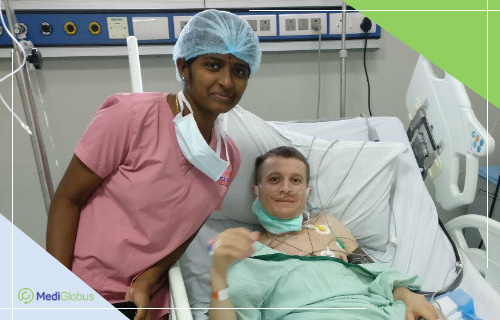
After the surgery, he stayed in the clinic for another 3 months before flying home. It was very interesting to watch his recovery. I had the impression that I was there, right next to him, as if the thousands of kilometres separating us were gone. This happened in 2018, and to this day we are still in touch. We have met once at a conference for patients living with donor organs. He lives a full life, and works. I regularly receive greetings from him on holidays.
Another interesting case happened during the pandemic when all flights were banned. It was very important for us to deliver the blood of one of our patients to a Turkish clinic. It was impossible to do it at that time – courier services did not work and civil aviation did not fly. But we found a way out of the situation. Through a lot of acquaintances and our other patients, we found a way out to the Consul of Ukraine in Turkey, who personally transported the blood of our patient on board of the state aircraft carrying the delegation of the Ukrainian Embassy in Turkey to Istanbul. It was an unforgettable experience. A special thank you to him, this man always helped patients from Ukraine undergoing long-term treatment in Turkey.
Tell us something about the partnerships that have played a major role in the success of MediGlobus
As I have already mentioned, we work closely with private and public charitable foundations around the world. For ethical and professional reasons, I cannot name many, but one such organisation is the Blood Drop Foundation, which looks after patients with haematological diseases.
Foundations come to us for independent advice and quality assurance of hospital billing, we also advise volunteers and help their patients.
Travel agencies also ask for our expert opinion – most of them from Kazakhstan, Uzbekistan and Georgia. Many of them, having no experience in this field, want to ensure maximum satisfaction of their client, so they do not refuse help in selecting a clinic abroad and in organising the trip. They turn to us for help, and our experts advise their clients.
Partnership with two major evacuation companies made it possible to carry out emergency medical evacuation of heavy patients by air for long distances and by ground ambulance in case of short distances.

Starting this year, we started to involve hoteliers in cooperation. The aim is to make the patient’s journey as easy and comfortable as possible. Now our specialists will also be able to help patients book hotels within walking distance of the clinics at below-market prices. This will help us to be more flexible in providing logistical services and not limit ourselves to standard offers, as well as to reduce the patient’s expenses on third-party services.
As you can see, our partner network is not just about hospitals. We do everything to cover all the needs of our patients to the maximum extent possible. I plan to adjust several other important links in the non-medical services provided to patients. This will put the level of service at a new, higher level.
The coronavirus has given us new opportunities. It was not possible to enter many countries for treatment, and local medical tourism specialists started to turn to us for help with medical issues in other countries. In this way, we became a reliable partner for colleagues from other countries who, before the pandemic, had specialised only in services at home. We gave them a broader perspective.
What are the most common requests from your patients?
MediGlobus offers a full medical coverage. We can find almost any medical service for a patient, whether it is an online consultation, bone marrow transplant or Argus ophthalmic implant.
&nb4
By far, the most popular destinations among our patients are Turkey, Spain, Poland, the Czech Republic and South Korea. The most frequent medical specialities are:
oncology (all kinds of cancer in all adults and children, nuclear medicine),
orthopaedics (joint prosthetics, arthroscopic surgeries), neurosurgery (spinal surgery, brain tumour surgeries),
neurology (epilepsy and similar syndromes, degenerative diseases such as Parkinson’s disease),
plastic surgery in all its variations,
rehabilitation (mainly after trauma, neurosurgery or orthopaedic surgery),
ophthalmology, hand microsurgery and radiosurgery are also popular.
As someone who has been working in medical tourism for many years, can you share your predictions – how will this field change over the next 10 years?
If the COVID pandemic has taught us anything, it is that we need to be prepared for unforeseen surprises – we are very dependent on international patient transport and similar constraints. Any pandemics and other difficulties will adjust our work and we will need to adapt to them.
Globally, I expect a shift in the popularity of countries towards the Asian market in the near future, following global trends. We are already starting to work in this direction – we have several promising clinics in South Korea and China, and we are looking for other partners.
Another trend that we can already start to observe is that patients are making their choice not among particular clinics, but particular doctors. In the age of the internet, any information is easy to find, and a doctor’s experience, certificates, and patient reviews are easily and quickly verified. A doctor’s reputation plays a huge role.



